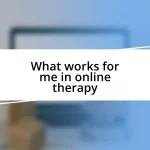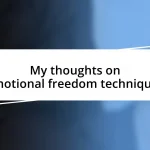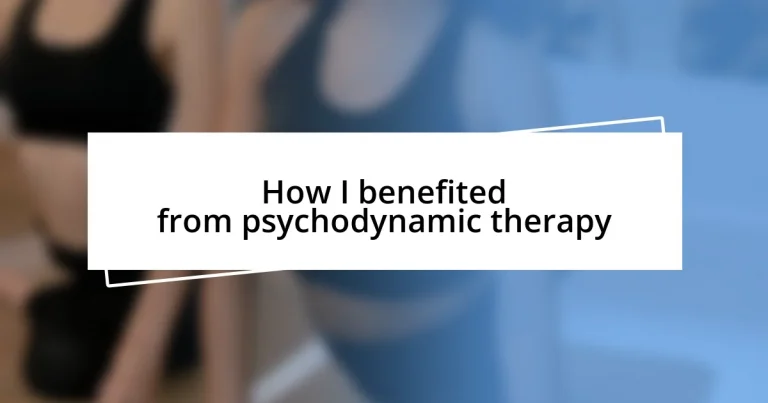Key takeaways:
- Psychodynamic therapy enhances self-understanding by exploring emotional responses and uncovering patterns from the past, leading to personal growth.
- The therapy journey involves navigating a range of emotions, questioning long-held beliefs, and embracing open communication for improved relationships.
- Continued self-reflection through techniques like journaling and mindfulness fosters lasting emotional resilience and a clearer sense of purpose.
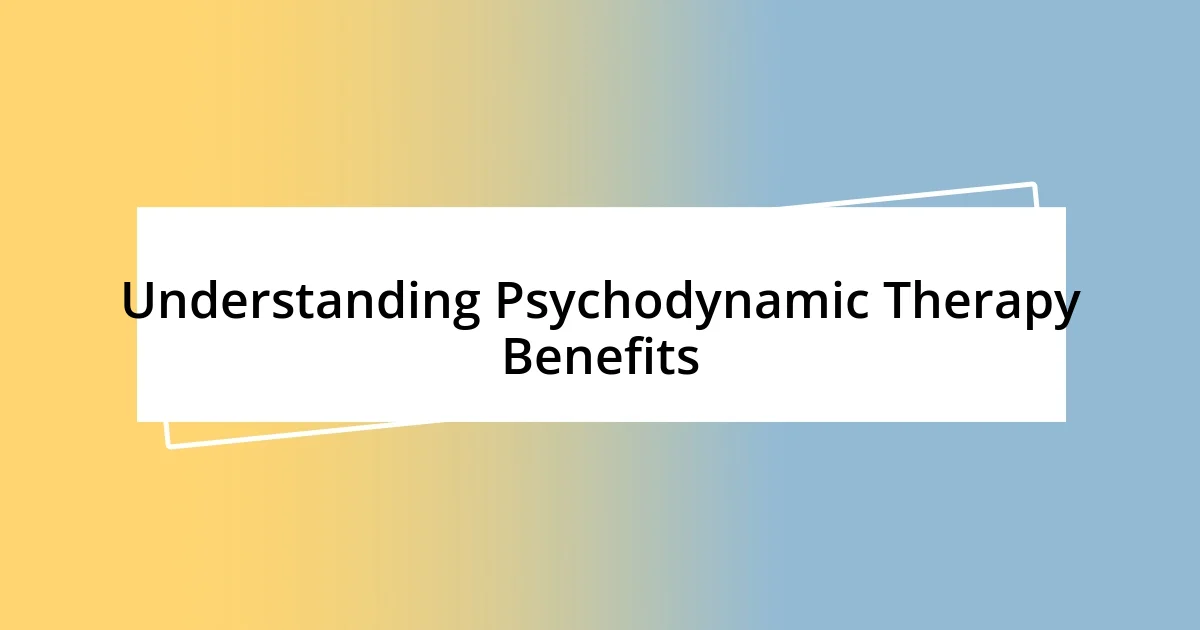
Understanding Psychodynamic Therapy Benefits
One of the most profound benefits I experienced through psychodynamic therapy was the clarity it brought to my understanding of my emotional responses. I remember sitting in session, wrestling with feelings that seemed to come out of nowhere. It occurred to me: why was I reacting so intensely to certain situations? This exploration revealed patterns in my past that shaped my present, helping me make sense of my reactions.
Another significant gain was developing a deeper understanding of my relationships. I often found myself mirroring my parents’ communication styles. Through our conversations, I started to question my behaviors and ask myself, “Is this really who I want to be?” Gradually, I learned to break these cycles, nurturing healthier connections.
Lastly, the supportive environment of therapy allowed me to uncover emotional layers I didn’t even know existed. I remember initially feeling overwhelmed by feelings of sadness that I had tucked away for years. However, as I engaged with these emotions, I felt a sense of release and liberation wash over me. Isn’t it fascinating how facing our inner world can lead to such profound personal growth?
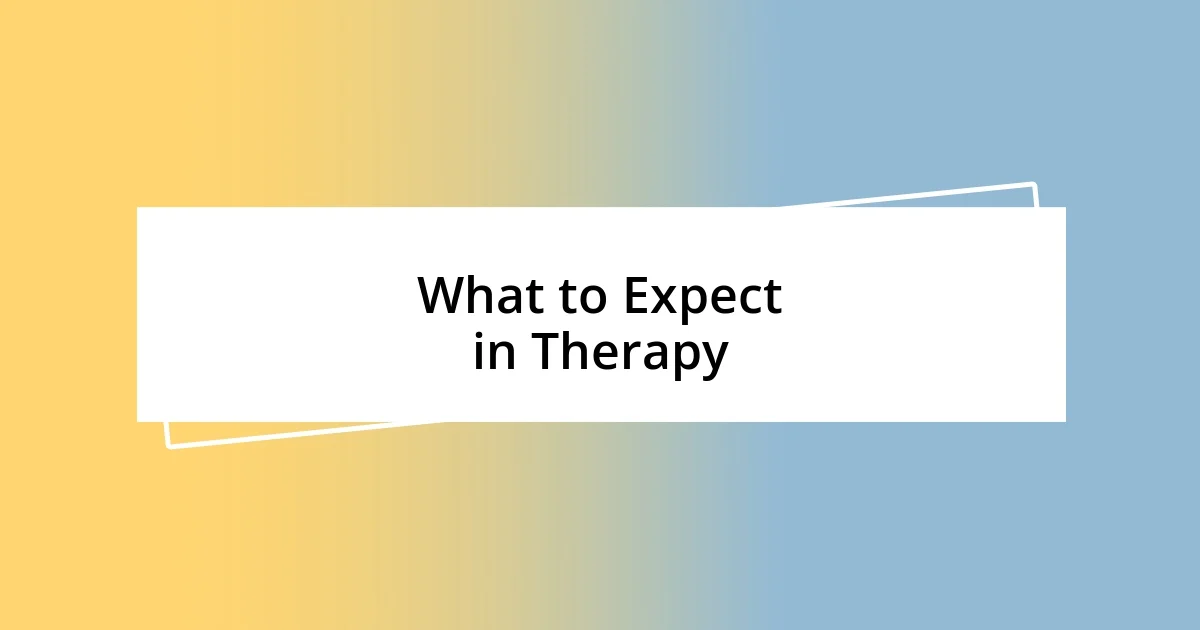
What to Expect in Therapy
When you enter therapy, expect it to be a journey rather than a quick fix. In my experience, the first few sessions can feel like an exploration. At times, it might seem like you’re just chatting, but these conversations often reveal deeper insights. I found myself often saying things I didn’t realize I felt until they came out. This process can be both eye-opening and challenging, but it sets the foundation for deeper emotional work.
You might also experience a range of emotions during therapy. One moment, I felt relief as I unpacked my thoughts, and the next, I found myself confronting painful memories. This ebb and flow of feelings is completely normal and part of the healing process. It’s important to embrace these emotions instead of pushing them away. Sometimes, it can even feel cathartic—like a storm clearing the way for sunshine afterward.
Lastly, expect to leave some sessions with more questions than answers. While this might feel unsettling, I learned that this ambiguity can be a crucial part of therapy. I remember walking out of a session, reflecting on a question my therapist posed: “What if your past doesn’t have to dictate your future?” It challenged me to rethink long-held beliefs and embrace the possibility of change. Keeping an open mind is essential as you navigate this transformative path.
| Aspect | Description |
|---|---|
| Session Structure | Initial sessions might feel casual, focusing on sharing experiences and feelings. |
| Emotional Range | Expect to experience various emotions, from relief to pain as you delve into past memories. |
| Questions vs. Answers | Leaving sessions with questions can feel unsettling, but it’s often a sign of growth and reflection. |
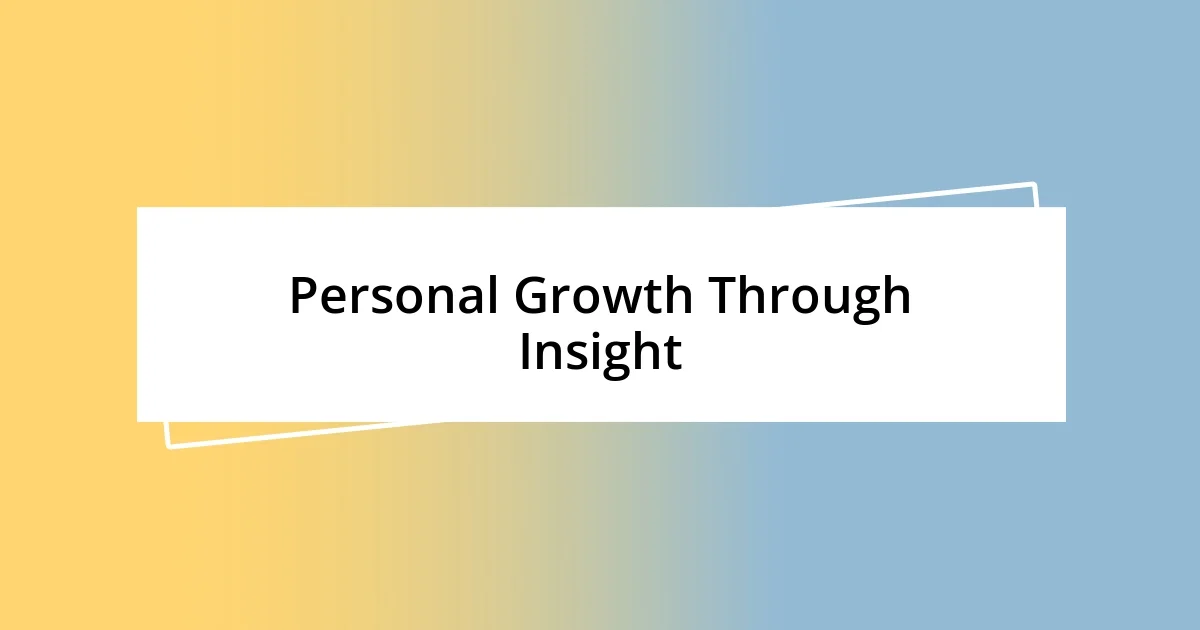
Personal Growth Through Insight
Personal growth through insight has truly been a transformative aspect of my journey in psychodynamic therapy. One of my key realizations was how certain core beliefs about myself—like feeling unworthy—stemmed from childhood experiences. I recall a session where I connected the dots, realizing a phrase from my past echoed in my mind whenever I faced new challenges. This insight was like lifting a veil; I began to understand that these ingrained beliefs didn’t define my reality unless I allowed them to.
- Through introspection, I began reframing my self-dialogue.
- I learned to ask myself probing questions, like “What if I am enough?”
- I started recognizing that my past doesn’t dictate my future.
- Each “aha” moment felt like a stepping stone towards self-acceptance.
I also discovered the importance of self-compassion during this time. Early in therapy, I’d often berate myself for perceived failures. However, as I explored the roots of this harsh self-critique, I began to view these moments as opportunities for growth rather than as permanent judgments. One day, I shared a frustration about a career setback, and my therapist asked, “How would you respond if a friend shared this with you?” This simple reflection shifted my perspective drastically—I started to nurture myself the way I would a close friend, paving the way for gentler internal conversations.
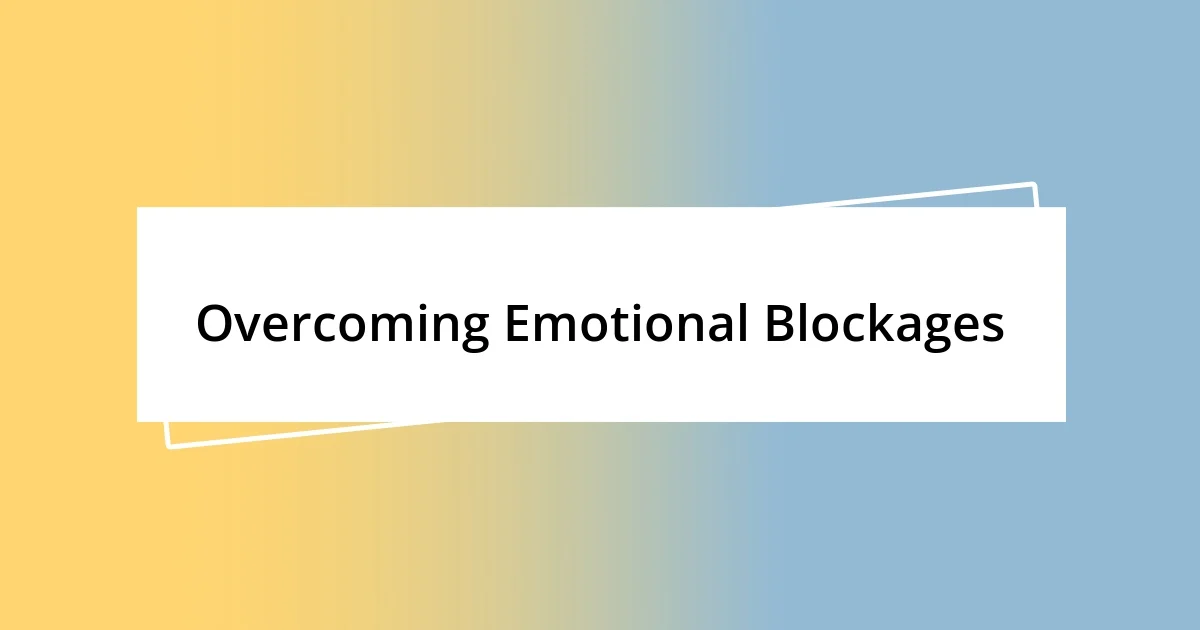
Overcoming Emotional Blockages
Overcoming emotional blockages during my therapy journey was like peeling back layers of an onion. I remember one particular session where I was struggling to understand why I kept avoiding certain relationships. As I spoke, I felt a knot in my stomach loosen. My therapist gently probed, and suddenly, I was reminded of a past betrayal that had left me feeling vulnerable. Recognizing this connection not only brought clarity but also sparked the desire to confront my fears directly.
As I navigated through these blockages, I began to understand that emotions aren’t just random feelings; they often hold valuable lessons. I vividly recall one moment when I felt an overwhelming wave of anger rise during a discussion about family dynamics. Instead of suppressing it, I let it flow and voiced my frustration. That cathartic release led to insights about boundaries I desperately needed to establish, teaching me the importance of honoring my own feelings as vital signals for change.
Eventually, I noticed a shift in how I approached my relationships. By recognizing and addressing my emotional blockages, I felt like a weight had been lifted. When old fears started creeping back in, I asked myself, “What would my future self advise me in this moment?” This reframing empowered me to push through discomfort, reminding me that growth often means stepping into the unknown but emerging stronger and more resilient.
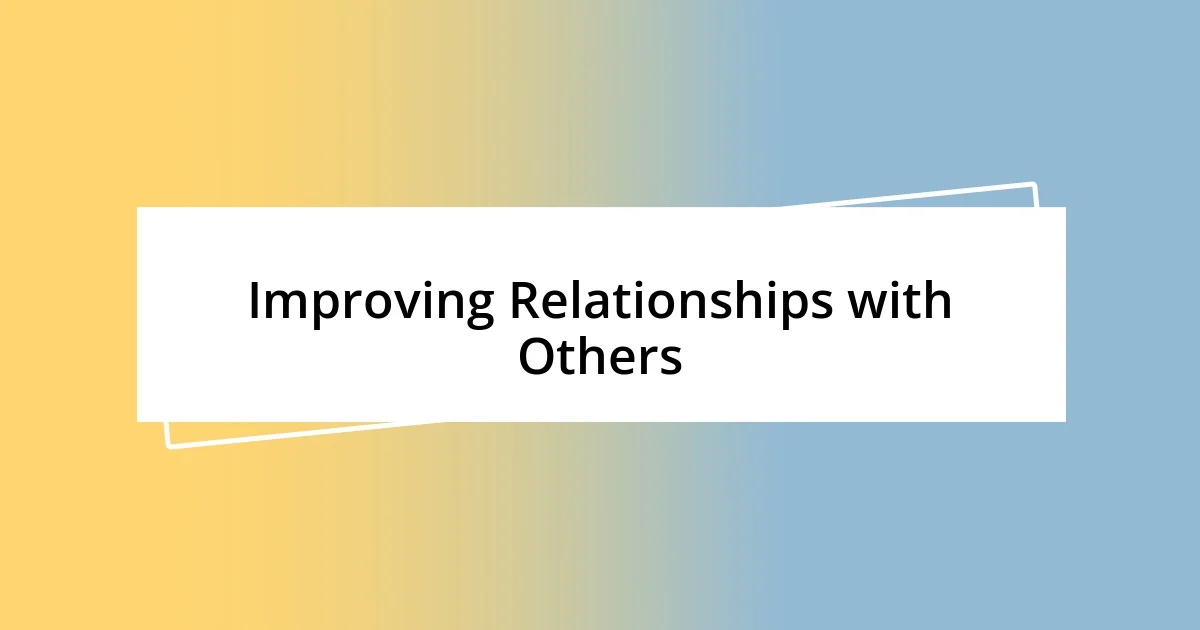
Improving Relationships with Others
I discovered that my relationships with others improved significantly as I explored the underlying patterns of my interactions. One day, while reflecting on why I struggled with confrontation, I had an unexpected realization. I recognized that my fear of conflict was tied to an old belief: that arguing would lead to abandonment. This revelation was eye-opening. It made me question whether avoiding tough conversations truly served my relationships or simply kept me from deeper connections.
As my therapy progressed, I started approaching relationships with a newfound openness. I remember the first time I spoke candidly to a friend about my feelings of frustration regarding our communication. Her surprised reaction turned into gratitude. “I didn’t know you felt that way,” she said, and that moment highlighted how much clarity and honesty can transform a bond. It dawned on me that vulnerability often fosters deeper intimacy. I began asking myself, “What do I truly need from my relationships?” This simple inquiry pushed me to articulate my desires honestly, leading to healthier connections in my life.
Navigating conflicts became less daunting as I learned to communicate more effectively. I recall a particularly heated discussion with a family member where, instead of retreating as I might have before, I practiced active listening. I genuinely tried to understand their perspective, and as a result, our conversation shifted from tension to mutual respect. This experience reinforced the idea that fostering understanding often requires patience and vulnerability. It made me ponder: How many misunderstandings could be resolved if we simply took the time to listen deeply?
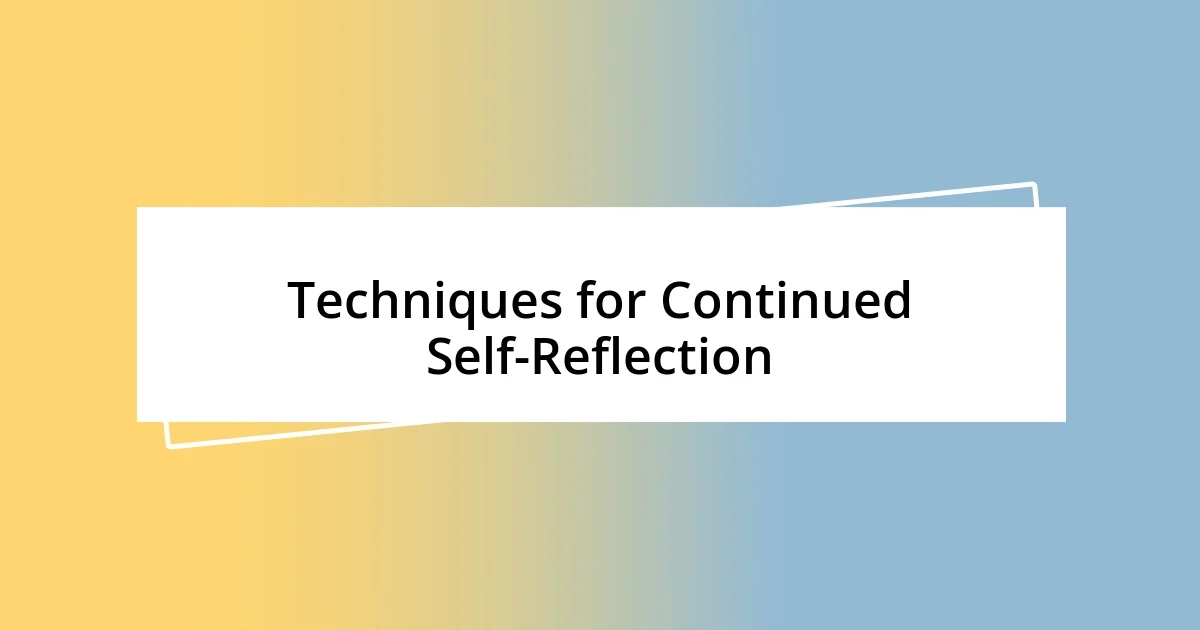
Techniques for Continued Self-Reflection
Self-reflection is a continual journey, and one technique I found particularly beneficial was keeping a journal. On days when emotions felt overwhelming, I would pour my thoughts onto the page—sometimes raw and unedited. This not only allowed me to process my feelings but also offered surprising clarity. Looking back at these entries, I often noticed patterns in my emotional responses that I could address in therapy. Have you ever tried journaling? You might be amazed at what you uncover about yourself.
Another effective technique for self-reflection is to engage in mindful meditation. I remember sitting quietly with my thoughts, letting them surface without judgment. One session, I noticed a recurring theme of self-doubt floating through my mind. As I sat with that uncomfortable feeling, I began to ask myself, “What is this doubt protecting me from?” This introspection opened doors to understanding the fears behind my hesitations, guiding me to confront them over time.
Lastly, discussing my reflections with trusted friends offered a dynamic perspective. After a particularly enlightening therapy session, I shared my insights with a close friend. As we exchanged thoughts, it struck me how different experiences shaped our interpretations. I found myself contemplating, why do we fear sharing our vulnerabilities? Opening up not only deepened my self-awareness but also strengthened my connections with others. These conversations became a mirror, reflecting aspects of myself I hadn’t fully acknowledged before.

Long-Term Effects of Psychodynamic Therapy
As I moved further along in my psychodynamic therapy journey, I noticed lasting changes in my emotional resilience. I vividly remember a moment after a stressful week when I faced a challenge at work that would have usually sent me into a spiral of anxiety. Instead, I paused, took a deep breath, and approached the situation calmly. The ability to remain grounded in stressful situations felt liberating. How often do we give ourselves that space to breathe before reacting?
Over time, I realized that this therapy not only addressed my past but redefined my future. For instance, I’ve become much more aware of my triggers and how they stem from earlier experiences. One day, while chatting with a colleague, I suddenly felt a wave of defensiveness when they criticized my idea. In the past, I would have internalized that feeling, but thanks to therapy, I recognized it instantly. That awareness allowed me to express my thoughts without attacking, ultimately fostering a more collaborative atmosphere. Isn’t it fascinating how understanding our past can reshape our present interactions?
The self-awareness I gained extended beyond personal interactions to my overall sense of purpose. I can distinctly recall an afternoon spent reflecting on what genuinely drives me. As I articulated my ambitions—both big and small—it felt as if a fog had lifted, revealing a clearer path ahead. I began to prioritize projects that aligned with these insights, which deeply resonated with my values. It’s almost like psychodynamic therapy helped me unscrew the foggy lens through which I viewed my life and replace it with a clearer, more focused one. Have you ever experienced that moment when everything suddenly makes sense? It’s transformative.
